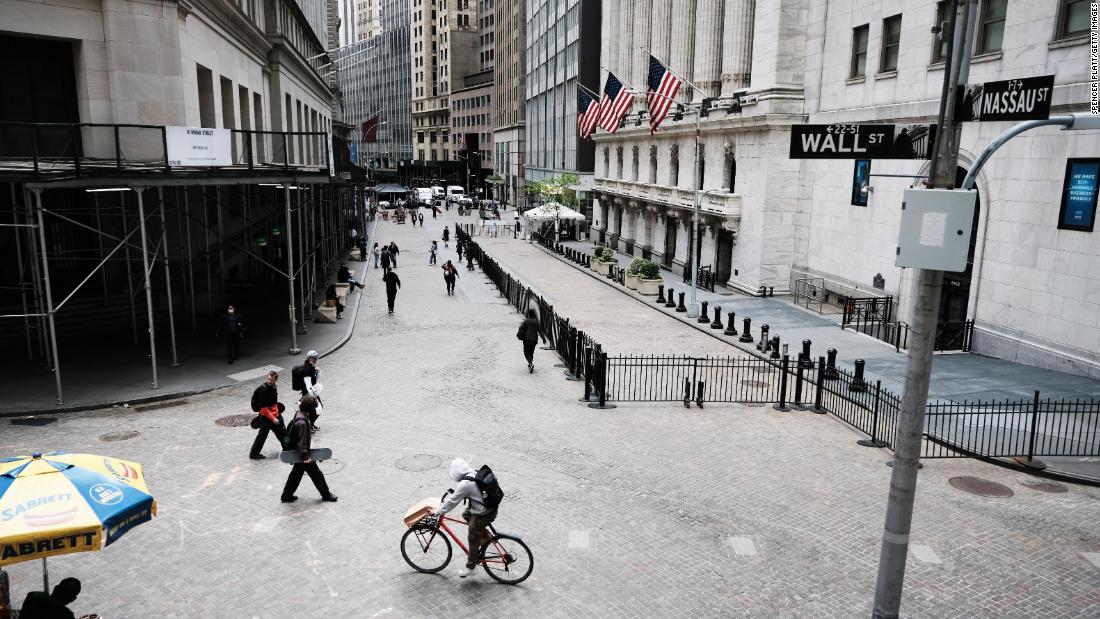
A version of this story first appeared in CNN Business' Before the Bell newsletter. Not a subscriber? You can sign up right here.
But investors have largely brushed off the risks, confident that vaccination campaigns will prevent the need for new lockdowns.
What's happening: The S&P 500 and Nasdaq Composite eked out fresh records on Tuesday, while Europe's Stoxx 600 index isn't far from its all-time high.
The Delta variant is significantly more transmissible than the Alpha strain of the virus that caused coronavirus cases to soar over the winter. So why have investors been so sanguine?
The muted market response is largely attributable to faith in vaccines. Moderna announced on Tuesday that its coronavirus vaccine was found in lab experiments to work against emerging variants including Delta. Shares of the US biotech company jumped 5% on the news.
A study by Public Health England this month also found that the Pfizer-BioNTech and Oxford-AstraZeneca vaccines are highly effective at preventing hospitalizations from the Delta variant after two doses.
That could reduce the need for additional restrictions that would hamper the economic recovery, which has been booming.
"Thanks to rapid vaccination progress, we consider it unlikely that medical systems in the UK or on the [European] continent will come under such pronounced strains again that new serious restrictions to economic activity will be needed ... to keep the medical risks under control," Holger Schmieding, chief economist at Berenberg Bank, told clients Wednesday.
Political leaders are trying to affirm this message, with the UK's new health minister saying he sees "no reason" to push back the country's official reopening date next month. He said the move will be "irreversible."
Consumers and businesses in major economies seem to believe the world is, in fact, turning a page on the crisis. Consumer confidence in the United States is at its highest level since the start of the pandemic, new data from the Conference Board showed Tuesday. United Airlines (UAL), meanwhile, just announced its largest aircraft purchase in the company's history, a huge bet on a resurgence in travel.
But variants continue to drum up a degree of uncertainty. On Wednesday, global stocks took a leg lower.
"It's not over," billionaire investor Warren Buffett told CNBC in an interview that aired Tuesday. "I mean, in terms of the unpredictability."
Didi shares will start trading during a frenzied week for IPOs
Didi is about to go public in the biggest US share offering by a Chinese company since Alibaba (BABA).
According to public filings, China's biggest ride-hailer could debut as soon as Wednesday on the New York Stock Exchange, my CNN Business colleague Michelle Toh reports. Reuters and the Wall Street Journal reported that Didi priced its shares at $14 apiece, raising about $4.4 billion.
That would make it the top Chinese IPO in the United States since Alibaba's $25 billion score in 2014, according to Dealogic.
And it would give Didi a valuation of more than $67 billion, according to the reports, which cited unnamed sources. Didi did not respond to a request for comment.
Big picture: Didi, which forced Uber (UBER) out of mainland China five years ago, is listing on Wall Street at a delicate time. The company has attracted scrutiny from regulators in China, where the tech sector is undergoing a historic crackdown. But it's still generating significant enthusiasm from investors at a hot moment for new market debuts.
"Chinese company IPOs in the US are booming this year and US investors are still increasing their exposure to Chinese stocks and bonds," Jeffrey Kleintop, chief global investment strategist at Charles Schwab, tweeted this week.
Watch this space: Renaissance Capital tallied 17 IPOs in the United States this week alone that could collectively raise $9.1 billion.
Another big name is Krispy Kreme, which is expected to raise $600 million, valuing the donut maker at $3.8 billion. Shares could start trading Thursday.
Why housing demand is about to weaken
Housing has been on a tear, with home sales, homebuilding and especially house prices rocketing higher. But stress lines are beginning to appear, Mark Zandi, chief economist at Moody's Analytics, writes for CNN Business.
Home prices have risen so far, so fast that they have become overvalued. Across the United States, house prices appear overvalued by approximately 10% to 15% when comparing price-to-income or price-to-rent ratios with their long-run historical averages, according to Zandi's analysis. Some markets, mostly in the South and West, are overvalued by more than 20%.
Why it matters: These housing markets are vulnerable to a meaningful price correction as mortgage rates eventually rise. And they will, with the Federal Reserve gearing up to signal it could start normalizing monetary policy in the medium term, Zandi notes.
Work from anywhere is also sure to partially unwind as companies ask their employees to come back into the office. Plus, the foreclosure moratorium and mortgage and student loan forbearances are set to expire in coming weeks.
House prices will be forced to adjust. Zandi does not foresee a bubble about to pop, but he does predict "some modest price declines in the most hyped-up high-end parts of the housing market, in second- and vacation-home locations, and in smaller and midsize cities that have seen the biggest influx of work-from-anywhere households."
Bed Bath & Beyond (BBBY), Constellation Brands (STZ) and General Mills (GIS) report results before US markets open. Micron follows after the close.
Also today: The ADP report on US private payrolls posts at 8:15 a.m. ET.
Coming tomorrow: OPEC and allies meet to discuss oil production goals.
"about" - Google News
June 30, 2021 at 07:39PM
https://ift.tt/35YEMeq
Wall Street isn't freaking out about the Delta variant. Here's why - CNN
"about" - Google News
https://ift.tt/2MjBJUT
Bagikan Berita Ini














0 Response to "Wall Street isn't freaking out about the Delta variant. Here's why - CNN"
Post a Comment